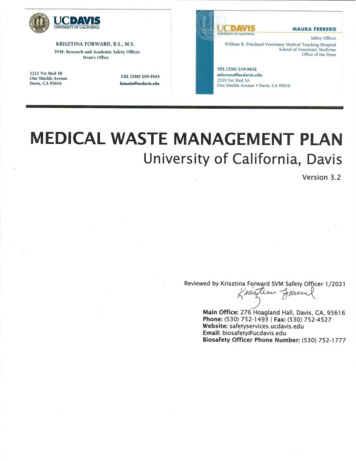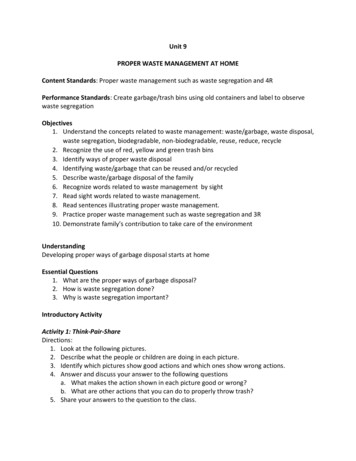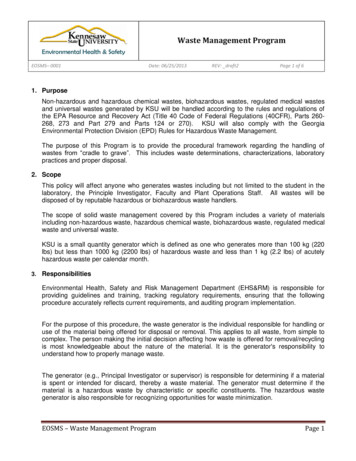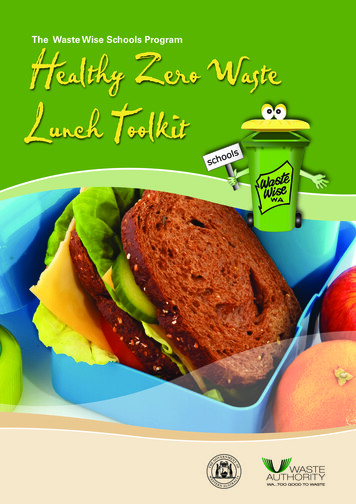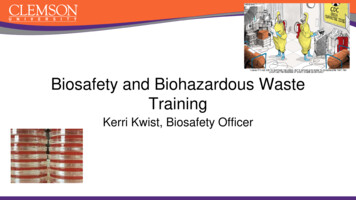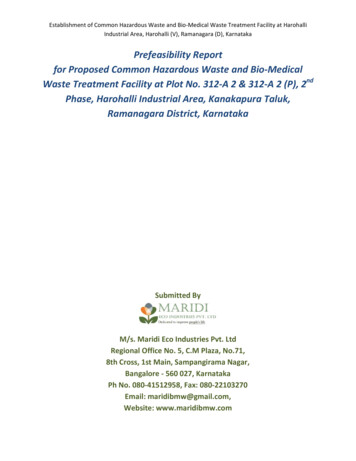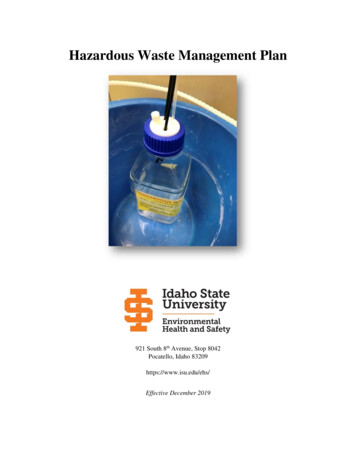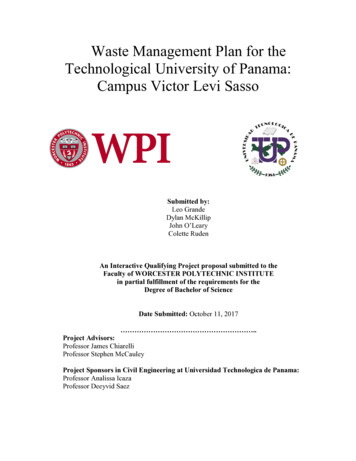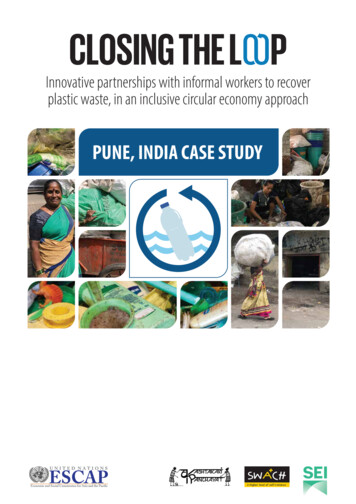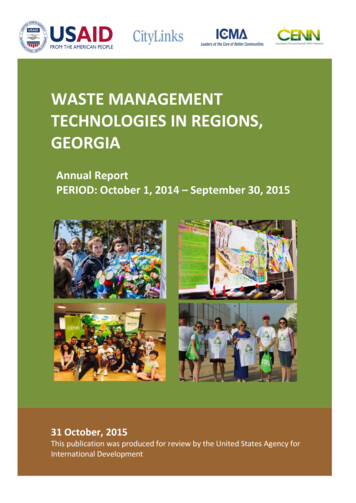
Transcription
WASTE MANAGEMENTTECHNOLOGIES IN REGIONS,GEORGIAAnnual ReportPERIOD: October 1, 2014 – September 30, 201531 October, 2015This publication was produced for review by the United States Agency forInternational Development
Waste Management Technologies in Regions, GeorgiaWaste Management Technologies inRegions, GeorgiaUSAID Cooperative Agreement AID-114-LA-14-00001Prepared for:Mission Environmental OfficerEconomic Growth OfficeUSAID CaucasusPrepared by:International City/County Management Association777 North Capitol Street NE, Suite 500Washington, DC 20002-4201The authors’ views expressed in this publication do not necessarily reflect the views of theUnited States Agency for International Development or the United States Government.Annual Report October 1, 2014 – September 30, 2015ii
Waste Management Technologies in Regions, GeorgiaCONTENT CONTENT. iii ABBREVIATIONS . 5 Program Background . 6 Assumptions, Problems and Barriers. 7 Significant Events and Achievements during the Reporting Period . 8 Status of Activities by Components . 12Component 1: Waste Collection and Recycling Systems . 12Component 2: Private Sector-led Recycling . 47Component 3: Waste Management Strategy and Tariff Policy. 62Component 4: Communication and Outreach . 66 Major Activities Planned for Next Quarter . 98ANNEXES:Annex 1.Municipal Waste Management Plan Development Guideline, Eng/GeoAnnex 2.The By-law on the Construction, Operation, Closure and After-Care ofLandfills (Eng/Geo)The draft of the By-Law on Rules of Collection and Treatment of MunicipalWasteWaste composition study methodology and results of summer season wastecomposition studyReport on EU Approaches on Waste Management (Eng/Geo)Annex 3.Annex 4.Annex 5.Annex 6.Annex 7.Report on Municipal Waste Management Capacity Analysis in Adjara AR andKakheti Region in GeorgiaMemorandum of Understandings: Telavi-Catawba, Batumi-GoldenAnnex 8.Reports of visit s of Telavi and Batumi delegations to Catawba and GoldenAnnex 9.The Gurjaani landfill closure planAnnex 10.Illegal Dumpsites Closure GuidelineAnnex 11.Memorandum of Understanding between the Project – Waste ManagementTechnologies in Regions and Waste Recycling Companies, agenda of theworkshop and list of participantsAnnual Report October 1, 2014 – September 30, 2015iii
Waste Management Technologies in Regions, GeorgiaAnnex 12.Charter of the Waste Management AssociationAnnex 13.EIA report for LTD Zugo and environmental permitAnnex 14.Draft strategy and action plan of waste management associationAnnex 15.Tariff and Cost-Recovery Assessment ReportAnnex 16.The Waste Fee Setting toolAnnex 17.Baseline assessment reportAnnual Report October 1, 2014 – September 30, 2015iv
Waste Management Technologies in Regions, GeorgiaABBREVIATIONSCENNDCOPEIACaucasus Environmental NGO NetworkDeputy Chief of PartyEUFBGHGGOGICMAISCEuropean UnionFacebookGreenhouse GasGovernment of GeorgiaInternational City/County Management AssociationISWMMOENRPNGOPSAPMPIntegrated Solid Waste ManagementMinistry of Environment and Natural Resources ProtectionNon-governmental OrganizationPublic Service AnnouncementPerformance Monitoring Plan4RsSWMNSWMCGTVUSAIDWMTRWMAReduce, Reuse, Recover, RecycleSolid Waste ManagementNational Solid Waste Management Company of GeorgiaTelevisionU.S. Agency for International DevelopmentWaste Management Technologies in RegionsWaste Management AssociationEnvironmental Impact AssessmentInstitute for Sustainable CommunitiesAnnual Report October 1, 2014 – September 30, 20155
Waste Management Technologies in Regions, GeorgiaProgram BackgroundThe USAID Waste Management Technologies in Regions Program (hereinafter referred to asWMTR) was awarded to International City/County Management Association (ICMA) on March18, 2014, under Cooperative Agreement AID 114-LA-14-00001. ICMA is implementing WMTR inpartnership with a local sub-recipient, Caucasus Environmental NGO Network (CENN) and theInstitute for Sustainable Communities (ISC). WMTR is designed to contribute to the followingUSAID monitoring and evaluation framework objectives and results: Strategy Development Objective 2: Inclusive and sustainable growth.Intermediate Result 2.3 More responsible management and development of Georgia’snatural endowments.Intermediate Result 2.3.3 Waste management improved.The goal of WMTR is to provide professional waste management technical assistance to supportwaste management system development and recycling in two regions of Georgia - Kakheti andAdjara AR. Project activities will promote greenhouse gas (GHG) mitigation and sequestration bydeveloping the waste management sector, including waste collection, recycling and publicawareness. Specifically, this project will enable GHG mitigation and sequestration from the wastesector by enabling the recycling business environment in targeted regions and municipalities;improving waste collection systems; minimizing pollution of natural resources from landfills byclosing down old, illegal landfills and dumpsites; enhancing public awareness of wastemanagement issues and ensuring public participation in the decision-making and designingprocess of new waste management systems. Additionally, ICMA will work closely with its localpartner, CENN, to build the capacity of its staff with the ultimate goal of WMTR handover in 2017.WMTR activities combine various components into a comprehensive structure that focuses ontechnical assistance and capacity/institution building of integrated waste management systemsand recycling/composting in two regions of Georgia – Kakheti and Adjara AR. WMTR has fourmain components: Component 1: Waste Collection and Recycling Systems Component 2: Private Sector-Led Recycling Component 3: Waste Management Strategy and Tariff Policy Component 4: Communication and OutreachWMTR also implements cross-cutting activities that support the four components above andpromote local governance. The cross-cutting activities include, among others, empowerment ofyouth and women, ethnic minorities and people with disabilities, and gender mainstreaming.This Annual Report covers the period from October 1 until September 30, 2015, within USAIDFiscal Year 2015.Annual Report October 1, 2014 – September 30, 20156
Waste Management Technologies in Regions, GeorgiaAssumptions, Problems and BarriersWMTR had to contend with the following assumptions, problems and barriers during thereporting period: Frequent turnover of governmental representatives; Miscommunication and lack of coordination between donor agencies working in thewaste management sector; Lack of communication between state institutions responsible for waste management inGeorgia; Non-existence of a waste management strategy and action plan1 in the country:WMTR project prepared the Municipal Waste Management Action Plan Guidelines;however, development of concrete action plans for the municipalities should bedelayed until the waste management strategy is finalized by the Ministry ofEnvironment and Natural Resource Protection (MoENRP); Lack of financial resources in the municipal budgets allocated for waste managementissues; Lack of technique and equipment (trucks, bins, etc.) in the municipalities required forwaste collection; Lack of accurate data and information related to waste management (i.e. non-existenceof waste composition information, amount of collected waste, GHG emissions fromlandfills, etc.):Due to the lack of accurate information required for calculation of the GHG emissionsfrom existing landfills in the Kakheti Region and Adjara AR, the project could notobtain reliable information to create baseline data. Therefore, it is important toconduct an actual measurement of GHG emissions from the existing landfills. Onlyafter obtaining measurement results will it become clear whether the existinglandfills in the project target regions have the potential to contribute to the reduction(and by how much) of GHG emissions. The GHG related project indicators should thenbe adjusted accordingly; Lack of local expertise in waste management issues; The very limited number of recycling companies with both the capacity and willingness tobe potential grant recipients is a serious problem; Socio-economic situation in the country; Lack of awareness by general public of integrated waste management issues: wasteseparation, recycling, tariff issues, etc.1According to the Ministry of Environment and Natural Resources Protection of Georgia, the waste managementstrategy and action plan will be finalized by the end of December, 2015.Annual Report October 1, 2014 – September 30, 20157
Waste Management Technologies in Regions, GeorgiaTo mitigate the potential problems and barriers, WMTR works closely with all tiers of governmentand other stakeholders in capacity building and has been using an intensive communication,outreach and awareness campaign to promote best practices in waste management andrecycling systems.Significant Events and Achievements during the ReportingPeriod In December 2014 and September 2015 the WMTR team organized Stakeholder ConsultativeGroup (SCG) meetings to facilitate its effective work as an advisory board for the WMTRprogram; The WMTR team in cooperation with international experts conducted an assessment ofcurrent GHG emissions in Kakheti Region and Adjara AR; In January 2015 the WMTR team developed an Integrated Solid Waste Management PlanDevelopment Guideline (ISWMPG) for municipalities in Georgia; The WMTR program developed GIS maps and an online web-portal showing informal dumpareas and current waste collection service coverage in the municipalities of the target regions; The WMTR team in collaboration with international and national experts and in closecooperation with the MoENRP developed a by-law on the construction, operation, closure andafter-care of landfills in accordance with the requirements of the Waste Management Code ofGeorgia. The by-law was approved by the government of Georgia; The WMTR team in collaboration with international and national experts and in closecooperation with the MoENRP developed a draft by-law on rules of collection and treatmentof municipal waste in accordance to the requirements of the Waste Management Code ofGeorgia; The WMTR team in collaboration with international and national experts and in closecooperation with the NSWMCG prepared Gurjaani landfill closure plan; The WMTR team developed a waste composition methodology. The methodology wascommunicated and agreed upon with the MoENRP and NSWMCG. The waste compositionstudy (summer season) was conducted in Kakheti region and Adjara AR according to thedeveloped methodology. The study will be conducted 4 times a year (summer, autumn,winter, spring) in both target regions; The WMTR program developed an analytical report on EU approaches in waste management,which summarizes the main directions, methods and instruments that the EU uses in relationto waste management.Annual Report October 1, 2014 – September 30, 20158
Waste Management Technologies in Regions, Georgia In April 2015, the WMTR team in close cooperation with the MoENRP organized a discussionon the topic - Waste Management Approaches in EU Countries in the Kakheti Region andAdjara AR; In July the WMTR team launched a pilot project - Piloting of Integrated Waste ManagementSystems in Target Areas of Telavi Municipality to demonstrate the benefits of integrated wastemanagement approaches (in particular waste separation and recycling) in target villages ofTelavi municipality. The pilot project is being implemented in the following 5 villages of theTelavi municipality: Tsinandali, Kvemo Khodasheni, Akura, Vanta and Busheti; The WMTR program conducted a municipal waste management capacity analysis of local selfgovernments, as well as of solid waste collection companies operating in the municipalities ofKakheti Region and Adjara AR. A “Municipal Waste Management Capacity Analysis in AdjaraAR and Kakheti Region in Georgia” report has been prepared and communicated with allstakeholders; In May, June and July 2015 the WMTR team organized trainings for local self-governmentrepresentatives from all municipalities of the Kakheti Region and Adjara AR on therequirements imposed by the new law – Waste Management Code and development ofbusiness plans; The WMTR team organized the first visits of delegations from Golden (Colorado) and CatawbaCounty (North Carolina) to Batumi (Adjara AR) and Telavi (Kakheti Region) in March 2015;Visits of a Georgian delegation from Batumi and Telavi to the city of Golden and CatawbaCounty in July and August 2015; and the second visit of the Catawba County delegation toTelavi in September 2015; The WMTR team in collaboration with international expert developed an illegal dumpsitesclosure guideline. The guideline was communicated and agreed upon with the MoENRP andNSWMCG; The WMTR team in collaboration with the local government cleaned 3 spontaneous dumpsitesin Adjara AR; The WMTR team arranged a waste collection system in the Sviana recreational zone incooperation with the local government of the Kakheti region; The WMTR team conducted assessment of the recycling market and individual companies inthe project target regions - Kakheti Region and Adjara AR and nationwide; The WMTR team conducted a series of national workshops, meetings and trainings forrecycling companies: second, third and fourth national workshops of recycling companies,meeting with the DCA Investment Officer and SIDA Investment Officer; number of meetingsof the members of board of Waste Management Association (WMA); Training on businessplan development; In June 2015 the Waste Management Association (WMA) created by the WMTR team wasofficially registered in the National Agency of Public Registry; the WMTR team in closecooperation with WMA board members developed a logo and a banner for the association;Annual Report October 1, 2014 – September 30, 20159
Waste Management Technologies in Regions, Georgia Further to the support provided by WMTR Zugo (a plastic recycling company) received anenvironmental permit in September 2015.According to the Georgian Law on Permit for Impact on the Environment, activities related towaste disposal, treatment or recycling, incineration, and landfill design and operation aresubject to permits and mandatory EIAs. Therefore, any recycling activity requires a permitfrom the MoENRP based on an Environmental Impact Assessment. The EIA process considerspossible impacts and risks on the different components of the physical, biological and humanenvironment; At the beginning of 2015 the WMTR team conducted the pre-award assessment of recyclingcompanies in project target regions; The WMTR team supported the Waste Management Association to develop a draft strategyand action plan; The WMTR team in cooperation with international and national experts developed a Tariffand Cost Recovery Assessment Report; In September 2015 the WMTR team tested a waste fee setting tool in Telavi self-governancecity; In December 2014 the WMTR program developed a 2015 4R calendar and distributed it amongstakeholders – governmental structures, international organizations, NGOs, and the businesssector; In May 2015 the WMTR team organized a public lecture, “Economic Aspects of WasteManagement: Role of Tariffs in the Economy of a Country” in Batumi and Telavi stateuniversities; In November 2015 the WMTR team organized a public lecture on integrated wastemanagement in Batumi State University; In April and May 2015 the WMTR team organized discussions on the topic of wastemanagement approaches in EU countries in Batumi and Telavi; In September 2015 the WMTR team organized a youth summit – Students for CleanEnvironment for school students from five regions of Georgia - Adjara, Kakheti, Imereti,Samegrelo, Samtskhe-Javakheti; In July and August 2015 the WMTR team conducted three 10 day eco-camps for schoolstudents from Adjara AR and Kakheti Regions. 71 winners of the Waste to Craft competitionparticipated in the eco-camps from both regions; During the fiscal year 2015 the WMTR team organized a series of clean-up campaigns in theproject target regions; The WMTR team developed two public service announcements (PSAs) on the importance ofa tariff system to show the linkage between tariff fee collection and a clean and healthyenvironment and on the promotion of the 4R principle;Annual Report October 1, 2014 – September 30, 201510
Waste Management Technologies in Regions, Georgia In September 2015 the WMTR team developed the design of an electronic game for 6-10 yearsold school students. The game will support the promotion of an integrated wastemanagement concept and develop proper behavior in terms of waste management; During the fiscal year 2015 the WMTR team conducted open educational classes on integratedwaste management issues for public school students; The WMTR team developed the program’s second, third and fourth quarterly newsletters inEnglish and Georgian and distributed them through the CENN electronic network, which hasmore than 25,000 subscribers worldwide; In April, May and June 2015 the WMTR team organized a series of trainings on project cyclemanagement for students of public schools of Kakheti Region and Adjara AR; On April 22, 2015 the WMTR program, together with the ECOVISION NGO, MoENRP, TbilisiCity Hall and Solid Waste Management Company of Georgia celebrated the 45 th annual EarthDay in Tbilisi Zoo; On May 3, 2015, the WMTR Program, with support from the MoENRP participated in LifeWorld Run in Kakheti, a global running event in aid of the search for a cure to spinal cordinjuries; On June 6, 2015 two USAID funded projects: WMTR and EC-LEDS participated together in theAmerica Days Festival at Rike Park, Tbilisi; In July 2015 the WMTR team conducted a training on project cycle management for Kakhetiand Adjara Teachers; In September 2015 WMTR and G4G conducted a joint offsite media tour for journalists ofprinted media, television and radio channels on waste management issues The WMTR staff continues updating the program Facebook (FB) Page. Through this FB pagethe general public, including school students from the project target regions are receivingupdates regarding the implementation of the program – competitions, trainings, workshops,grant announcements; information about ongoing activities and news on modern practices inwaste management; In April, 2015 the project team started preparation of the weekly green advice, distributingthose messages through the CENN electronic network and posting them on the project FBpage every week. The aim of the green advice is to change the behavior of the general publicand show them ways to apply 4R (reduce, reuse, repurpose, recycle) practices in everyday life.Annual Report October 1, 2014 – September 30, 201511
Waste Management Technologies in Regions, GeorgiaStatus of Activities by ComponentsComponent 1: Waste Collection and Recycling SystemsFacilitate the Stakeholder Consultative Group (SCG) advisory roleSecond Stakeholder Consultative Group MeetingOn December 16, 2014, the second meeting of the Stakeholder Consultative Group (SCG) wasorganized in the Holiday Inn Hotel, Tbilisi. During the meeting the WMTR team presented theactivities implemented and results from the period March 18 – September 30, 2014, as well asfuture plans for the next fiscal year (October 1, 2014 – September 30, 2015). SCG membersactively participated in the discussion and provided positive feedback on the implementedactivities. Members of the WMTR staff received a number of questions and suggestions aboutfuture plans. The main emphasis during the meeting was the importance of synergy amongvarious waste management programs implemented in Georgia by the international communityin order to avoid the duplication of activities within different programs operating in the wastemanagement sector and contribute to the achievement of set goals. As a result of the meeting,the participants agreed on continuing efforts to make program activities more efficient byensuring coordination with other stakeholders.Third Stakeholder Consultative Group MeetingOn September 29, 2015, the third meeting of the Stakeholder Consultative Group (SCG) wasorganized in Betsy’s Hotel, Tbilisi.The meeting was attended by all stakeholders working on waste management issues: NSWMCG,MoENRP, representatives of the Environmental Protection Division of Adjara, Batumi and TelaviAnnual Report October 1, 2014 – September 30, 201512
Waste Management Technologies in Regions, GeorgiaCity Halls and Telavi Municipality, as well as representatives of international organizations andNGOs.The WMTR team presented all the activities and documents implemented and developed duringthe period of January-September 2015, particularly: Municipal Waste Management Plan Development Guidelines developed in cooperationwith the Ministry of Environment and Natural Resources Protection of Georgia; Maps and a web portal reflecting results of the inventory of illegal dumpsites and wastecollection service coverage areas; Technical Regulation on Construction, Operation, Closure and Aftercare of Landfillsdeveloped in cooperation with the Ministry of Environment and Natural ResourcesProtection of Georgia; Gurjaani Solid Household Waste Landfill Closure Plan developed in cooperation with theSolid Waste Management Company of Georgia; Waste Management Association of Georgia, officially founded and registered in PublicRegistry. Strategy and Action Plan of the Association developed.During the meeting, project experts provided a detailed presentation of the Technical Regulationon Construction, Operation, Closure and Aftercare of Landfills and the Closure Plan of GurjaaniSolid Household Waste Landfill. The meeting was conducted in an interactive manner.In addition the program team presented plans for FY 2016 to inform the stakeholders aboutfuture activities of the project and support coordination between different programs.Annual Report October 1, 2014 – September 30, 201513
Waste Management Technologies in Regions, GeorgiaConduct a preliminary environmental assessment and an assessment of currentGHG emissions in Kakheti Region and Adjara ARThe mitigation of GHG emissions from solid waste processes and facilities is an importantelement of the Project. WMTR key solid waste management elements include the closure ofexisting municipal disposal areas that will be replaced by regional landfills built to soundinternational standards by the National Solid Waste Management Company of Georgia(NSWMCG). The design features of closure plans should be based on the actual environmentalimpact of sites. Therefore, the actual emissions of methane (the key GHG gas typically associatedwith disposal functions) will be important in further defining the requirements of closure tomitigate emissions.9 landfills are located in the WMTR project target regions – 7 landfills in Kakheti and 2 landfills inAdjara. The design of these landfills is basic, with no bottom lining and no gas collection systems.Fires, fueled by the release of methane from such landfills, have been common. Consequently,the existing landfills have a negative impact on the environment and human health. It should benoted that the GHG emissions that will be encountered at the different landfills are expected tovary significantly as a result of a number of factors including but not limited to the amount andcharacteristics of the waste placed into the landfill; the physical characteristics of the disposalsite including waste depth; the manner in which each disposal area was historically operated etc.Obtaining accurate baseline data on GHG emissions, including emissions from landfills anddumpsites, is essential to meeting the overall WMTR project objectives. Unfortunately, at thisstage such data does not exist in Georgia. The collection of actual data on GHG emissions fromlandfills will enable the WMTR project and the Government of Georgia to decide what kind ofactions should be implemented in each particular landfill to reduce GHG emissions.The WMTR program conducted an assessment of current GHG emissions from landfills in Kakhetiand Adjara with the support of international experts, using the IPCC Solid Waste Excel Model forcalculation of quantities of CH4 emissions. However, due to the lack of initial data required by themodel the received results were very inaccurate, with a high degree of uncertainty.Therefore, in consultation with international experts and NSWMCG the WMTR team decided topurchase portable equipment that will allow near surface measurement of actual methaneemissions to determine the actual level of methane emissions from existing disposal areas in theproject target regions, plan greenhouse gas (GHG) mitigation measures and later make thisprocess replicable for other regions.The purchased portable equipment for landfill gas (GHG) emissions measurement will betransferred to NSWMCG and technical support will be provided to the company on how to usethis equipment. From their side the NSWMCG will measure landfill gas (GHG) emissions from thelandfills designated by the WMTR project located in project target regions – Kakheti and AdjaraAR and share the results of the measurements with the WMTR project.Annual Report October 1, 2014 – September 30, 201514
Waste Management Technologies in Regions, GeorgiaDesigning region-specific ISWM strategies and action plansDevelopment of the Integrated Solid Waste Management Plan Developments Guideline(ISWMPG) for municipalities in GeorgiaThe WMTR program in collaboration with international and local experts and in close cooperationwith the Ministry of Environment and Natural Resources Protection (MoENRP) developed anIntegrated Solid Waste Management Plan Development Guideline (ISWMPG) for municipalitiesin Georgia. The guideline will serve as a basis for the development of individual municipal wastemanagement plans, which are required by the law.According to article 13 (1) of the Law of Georgia – “Waste Management Code”2: each municipalityshall adopt a plan for the management of the municipal waste produced within its territory for aperiod of five years. The guideline developed by the WMTR program will serve as a basis for thedevelopment of these municipal waste management plans, which are required by the law.The ISWMPG was developed in accordance with the general content provided in the Law ofGeorgia – “Waste Management Code”. The guideline describes the steps that should beundertaken for the development, implementation and monitoring of the municipal wastemanagement plans, as well as outline the content of these plans.In particular, the following chapters are presented in the guidelines: Introduction; The basis for developing municipal waste management plans; Preparing to develop a municipal waste management plan; Determining and assessing existing conditions; Evaluating options and making decisions; Developing and adopting the municipal waste management plan; Implementing the plan; Operating, monitoring and sustaining the plan’s results; Annexes: Example of a Waste Plan Table of Contents, Planning Information Checklist,Template and Glossary of Acronyms / Abbreviations, and Key Waste ManagementTerms.The guideline has been agreed with and approved by the MoENRP. The guideline has alreadybeen communicated with the Stakeholder Consultative Group members and with localgovernments through workshops and roundtables. With this guideline, municipalities have a2The law was enacted on January 15, 2015.Annual Report October 1, 2014 – September 30, 201515
Waste Management Technologies in Regions, Georgiaunified document that will serve as a basis in the process of the municipal waste managementplans’ development.Annex 1. Municipal Waste Management Plan Development Guideline, Eng/GeoGIS maps and an online web-portal showing informal dump areas and current wastecollection service coverage per municipalities of the target regionsThe WMTR program developed GIS maps and an online web-portal, (Link) which show informaldump areas and current waste collection service coverage in municipalities of the target regions.Waste collection coverage areas andinformal dump sites in the AkhmetaMunicipalityAnnual Report October 1, 2014 – September 30, 2015Waste collection coverage areas andinformal dump sites in the TelaviMunicipality16
Waste Management Technologies in Regions, GeorgiaThe information was collected through official letters that were sent to all municipalities in thetarget regions, requesting the following information: Areas covered by the current waste collection service on a village level (if the service doesnot cover the whole territory of the village, it had to be indicated what part of village iscovered by the collection service). Location of informal dump areas (specific areas and GPS coordinates where they areavailable), their number, area and type of waste allocated for the dumping area.The information received shows that in most municipalities waste service coverage is less than50%. Services mainly cover municipalities’ centres and villages adjacent to central motorways,while relatively remote villages remain unserved. Informal
The USAID Waste Management Technologies in Regions Program (hereinafter referred to as WMTR) was awarded to International City/County Management Association (ICMA) on March 18, 2014, under Cooperative Agreement AID 114-LA-14-00001. ICMA is implementing WMTR in . Waste Management Technologies in Regions, Georgia .
